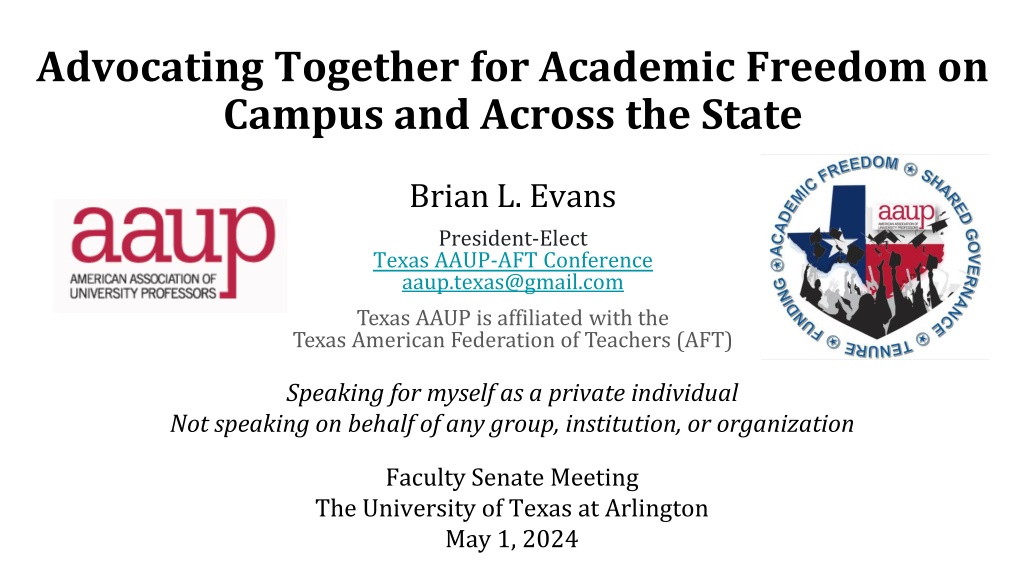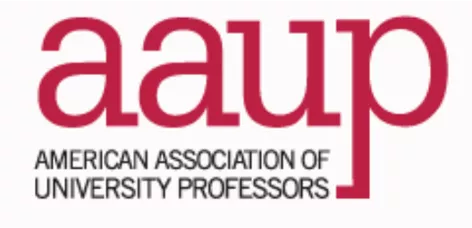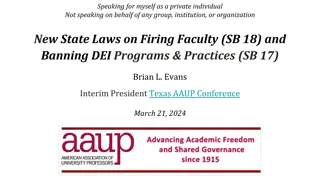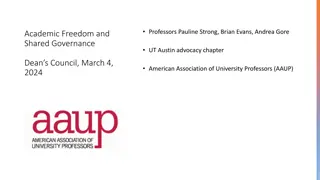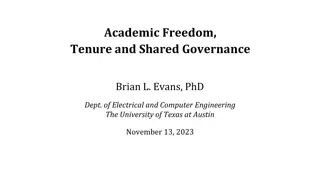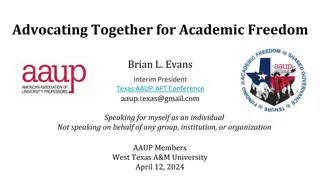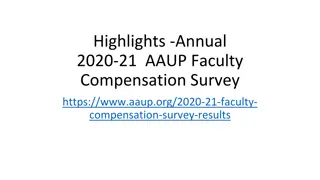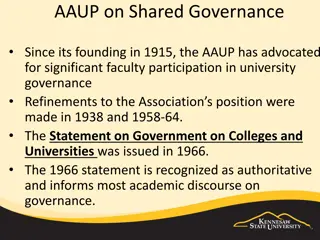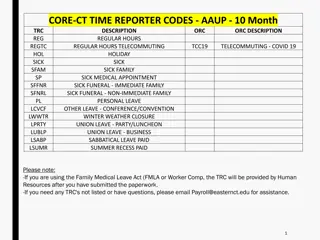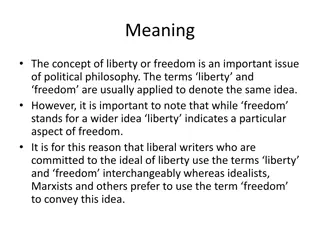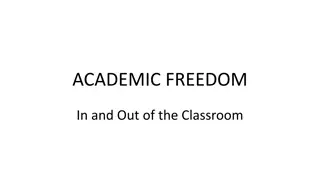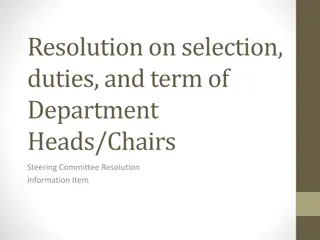Advocating Together for Academic Freedom - Texas AAUP Conference 2024
Advocating for academic freedom at universities, the Texas AAUP conference will address the importance of shared governance, economic security, and quality education. The conference aims to empower faculty to innovate in research and teaching, fostering critical thinking and diversity of viewpoints. Joint principles on academic freedom and tenure are highlighted, emphasizing the role of safeguards like tenure and due process in protecting faculty rights and advancing knowledge.
Download Presentation

Please find below an Image/Link to download the presentation.
The content on the website is provided AS IS for your information and personal use only. It may not be sold, licensed, or shared on other websites without obtaining consent from the author. Download presentation by click this link. If you encounter any issues during the download, it is possible that the publisher has removed the file from their server.
E N D
Presentation Transcript
Advocating Together for Academic Freedom on Campus and Across the State Brian L. Evans President-Elect Texas AAUP-AFT Conference aaup.texas@gmail.com Texas AAUP is affiliated with the Texas American Federation of Teachers (AFT) Speaking for myself as a private individual Not speaking on behalf of any group, institution, or organization Faculty Senate Meeting The University of Texas at Arlington May 1, 2024
American Association of University Professors AAUP founded in 1915 by faculty and has 45,000 members. AAUP champions academic freedom, advances shared governance, and organizes all faculty to promote economic security and quality education. AAUP affiliated with the American Federation of Teachers (1.7M members including 148,000 professors) Aug. 2022 Consider Joining AAUP
1940 Joint AAUP/AAC&U Statement of Principles on Academic Freedom & Tenure (2600 words) Jointly formulated by Faculty (AAUP) and Presidents (AAC&U) American Association Colleges & Universities (AAC&U): 860+ institutions Principles adopted by all seven public university systems in Texas Academic Freedom for teachers consists of interrelated elements freedom to explore all avenues of scholarship, research, and creative expression and to publish the results of such work freedom to discuss all relevant matters in the classroom freedom from institutional censorship or discipline when speaking or writing as participants in the governance of an educational institution freedom from institutional censorship when speaking or writing as a citizen Free inquiry, free expression, and open dissent are critical for student learning and the advancement of knowledge here citizen means a member of society 1940 Statement: https://www.aaup.org/report/1940-statement-principles-academic-freedom-and-tenure
1940 Joint AAUP/AAC&U Statement of Principles on Academic Freedom & Tenure Academic freedom empowers teachers to bring the latest breakthroughs into the classroom innovate in scholarly research and creative endeavors develop and disseminate new knowledge from all viewpoints, including conservative, moderate, liberal, and apolitical (viewpoint diversity) help students develop the critical thinking, knowledge, training, and professional networks for successful careers Safeguards include tenure, due process, shared governance Critical thinking is a required course outcome by THECB. [1] Required for university accreditation [2, p. 54] The institution publishes and implements appropriate policies and procedures for preserving and protecting academic freedom [1] Texas Higher Ed. Coordinating Board, Lower Division Academic Course Guide Manual, Spring 2018. [2] SACSCOC Resource Manual for the Principles of Accreditation: Foundations for Quality Enhancement, Feb. 2024
UT Regents Rule 31004 Rights and Responsibilities of Faculty Members [1] Sec. 1 Freedom in Research. Faculty members are entitled to full freedom in research and in the publication of the results. Sec. 2 Freedom in the Classroom. Faculty members are entitled to freedom in the classroom in discussing his or her subject, but are expected not to introduce into their teaching controversial matter that has no relation to his or her subject. Sec. 3 Clarification of Role. Faculty members are citizens, members of learned professions, and officers of an educational institution supported by the State of Texas. When the faculty member speaks or writes as a citizen, he or she should be free from institutional censorship or discipline, but should make it plain that the faculty member is not an institutional spokesperson . Text above is identical to, or a simple rewording of, text in the 1940 AAUP/AAC&U statement which AAUP encourages (see additional slides) RR31004 https://www.utsystem.edu/board-of-regents/rules/31004-rights-and-responsibilities-of-faculty-members
1966 Joint Statement on Government of Colleges and Universities (3500 words) Jointly formulated by Faculty (AAUP), Presidents (ACE) and Trustees (AGB) American Council on Education (ACE): 1500+ institutions including UT Arlington and UT System Assoc. Gov. Boards of Univ. & Colleges: 1300+ members including UT System Faculty have primary decision-making authority in Curriculum, subject matter, and methods of instruction Those aspects of student life which relate to educational process Matters related to faculty status appointments, reappointments, decisions not to reappoint, promotions, granting of tenure, and dismissal President should exercise adversely only in exceptional circumstances, and for reasons communicated to the faculty & receive faculty feedback Faculty have authority in financial exigency and program closures 1966 Joint Statement, https://www.aaup.org/report/statement-government-colleges-and-universities
1966 Joint AAUP/ACE/AGB Statement on Government of Colleges and Universities President shares responsibility in Definition and attainment of goals Administrative action Communications to link components of academic community President provides institutional leadership Innovate, initiate, and persuade others to work toward goals Utilize judgments of the faculty and outside competent scholars Ensure standards and procedures conform to policy established by the board and standards of sound academic practice Manage and create resources President represents institution to public 1966 Joint Statement, https://www.aaup.org/report/statement-government-colleges-and-universities
1966 Joint AAUP/ACE/AGB Statement on Government of Colleges and Universities Maintains a general overview of the institution Entrusts conduct of administration to administrative officers Entrusts conduct of teaching and research to the faculty Publishes codified statements defining policies and procedures Provides long-term resource planning and oversees endowment Obtains capital and operating funds Supports institution when ignorance or ill will threatens any part In grave crises it will be expected to serve as a champion. Governing Board Roles SACS: "governing board protects the institution from undue influence by external persons or bodies. [2, p. 29] [1] 1966 Joint Statement, https://www.aaup.org/report/statement-government-colleges-and-universities [2] SACSCOC Resource Manual for the Principles of Accreditation: Foundations for Quality Enhancement, Feb. 2024
Legislative and Community Advocacy Higher ed is a mystery to Legislators and the general public 48% of Texans aged 25-64 have enrolled in an institution of higher ed 30% of Texans aged 25-64 have completed higher ed certificate or degree Advocacy is telling your story about how higher ed helps our state Why are academic freedom, tenure, shared governance, and other higher ed values are important to you in teaching, research and expression? How has the teaching and research in your discipline benefited Texans? As a private individual, you have freedom to express your views per First Amendment Rights be clear who you are speaking for And you can team up with a group to advocate .
Texas AAUP Conference Members at 75 universities, comm. colleges, health-related inst. AAUP affiliated with Amer. Federation of Teachers Aug. 1, 2022 Advocacy for higher ed values Ramped up by Texas AFT (10/22) and NAACP LDF (2/23) Wrote op-eds and blogs, and tweeted @TexasAaup Created higher ed bill tracker & interviewed with reporters ** Coordinates with 10 higher ed advocacy orgs Legislative training, updates and visits ** Testifying at Texas Senate and House committee hearings ** Campaigns for Legislative outreach ** Collaboration with the Texas Council of Faculty Senates ** As private citizens / AAUP members
Texas AAUP Advocacy Outcomes in the Last Texas Legislative Session In the House, our coordinated effort among 10 higher ed advocacy orgs Able to change the legal definition of tenure in tenure bill from one- year guaranteed employment contracts to continuous employment. Influenced changes in anti-DEI bill including several exceptions for external grants. Helped defeat the censorship bill Karma R. Ch vez, Lessons from AAUP Advocacy in Texas, Academe, 2023. How a revived AAUP chapter and a coalition of allies mobilized against a legislative assault.
Interim Legislative Charges Concerning Higher Ed Apr. 11, 2024, Lt. Gov., 2024 Interim Legislative Charges. Faculty Senates Innovation and Technology in Higher Education (AI) Monitor the Ban on Discriminatory DEI Policies Faculty Tenure Revisions Combating Antisemitism on Texas College Campuses Public Junior College State Finance Program Campus Free Speech Apr. 4, 2022, Lt. Gov., 2022 Interim Legislative Charges. Removal of tenure and dismissal of tenured faculty members [became SB18] Role of faculty senates in representing faculty interests to the administration US History Requirements to ensure Critical Race Theory is not included [became SB16]
Thank You! Consider joining AAUP Consider forming an AAUP Chapter on campus Helps faculty connect with other faculty across campus Gives training on academic freedom, departmental and college governance, and how to get your voices heard Works with Faculty Senate to change policies and encourages members to run for Faculty Senate Provides faculty mentoring Hosts seminars on academic freedom Gives training in Legislative advocacy Advocates at the State Legislature 8 new AAUP campus chapters have formed in Texas since January 1, 2024
1940 Joint AAUP/AAC&U Statement of Principles on Academic Freedom & Tenure Academic Freedom (emphasis is mine) 1.Teachers are entitled to full freedom in research and in the publication of the results, subject to the adequate performance of their other academic duties; but research for pecuniary return should be based upon an understanding with the authorities of the institution. 2.Teachers are entitled to freedom in the classroom in discussing their subject, but they should be careful not to introduce into their teaching controversial matter which has no relation to their subject.4Limitations of academic freedom because of religious or other aims of the institution should be clearly stated in writing at the time of the appointment.5 3.College and university teachers are citizens, members of a learned profession, and officers of an educational institution. When they speak or write as citizens, they should be free from institutional censorship or discipline, but their special position in the community imposes special obligations. As scholars and educational officers, they should remember that the public may judge their profession and their institution by their utterances. Hence they should at all times be accurate, should exercise appropriate restraint, should show respect for the opinions of others, and should make every effort to indicate that they are not speaking for the institution .
Texas AAUP Affiliation with Texas American Federation of Teachers March 2024 Autonomy.Texas AAUP would continue to operate under its by-laws and practices. Amplified advocacy. Texas AFT has 66,000 members and dedicated full-time staff. Members can be from public or private institutions of higher education. Member benefits include occupational liability coverage, legal aid for civil cases, legal defense for employment matters, and advocates for dispute resolution. Officer benefits include Board of Directors insurance. Amid Attacks on Higher Education, Texas AAUP Votes to Affiliate with Texas AFT, April 4, 2024 Historic vote by Texas AAUP approves affiliation with the Texas AFT, March 30, 2024
New AAUP campus chapters formed in Texas since January 1, 2024 Lamar University January 2024 Texas Woman's University February 2024 University of Houston March 2024 Texas State University April 2024 Tarleton State University April 2024 West Texas A&M University April 2024 Trinity University April 2024 Sam Houston State University April 2024
